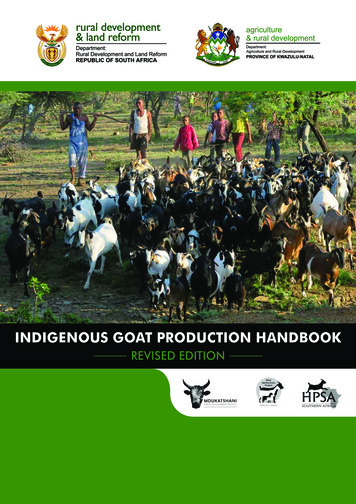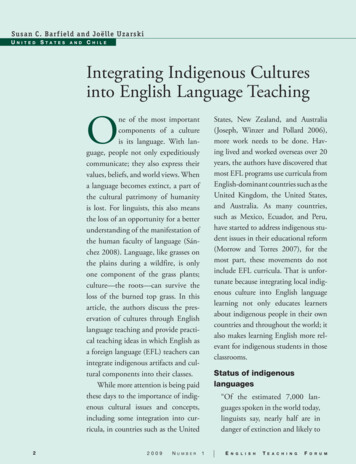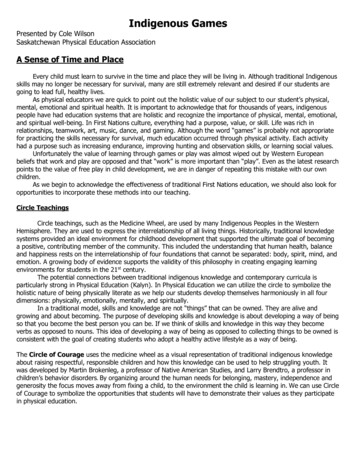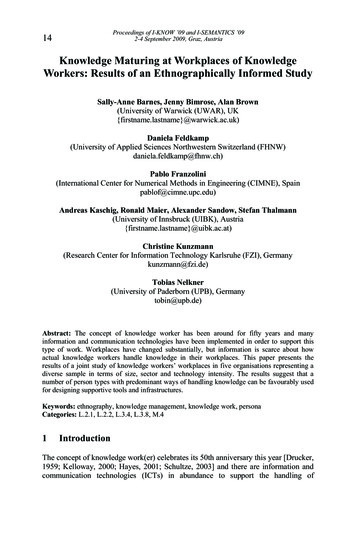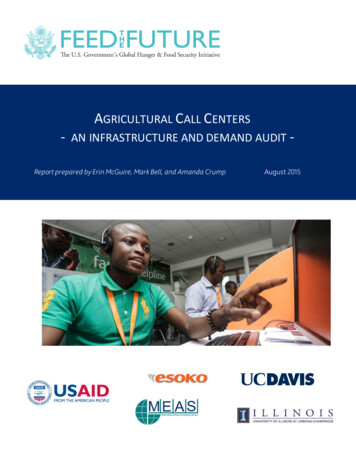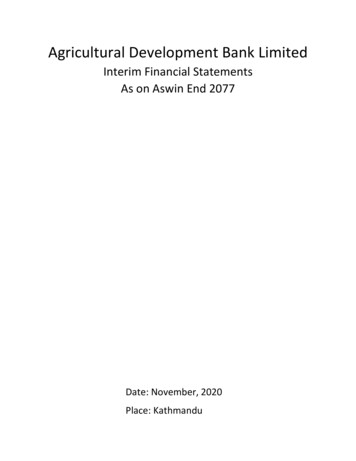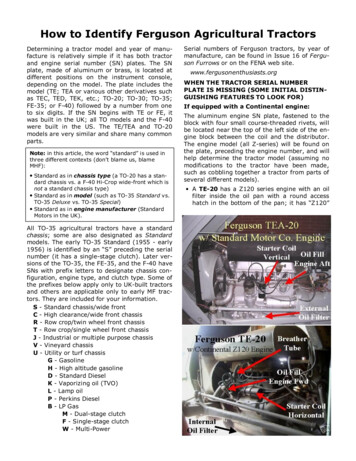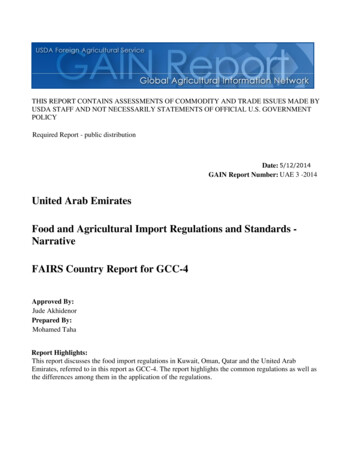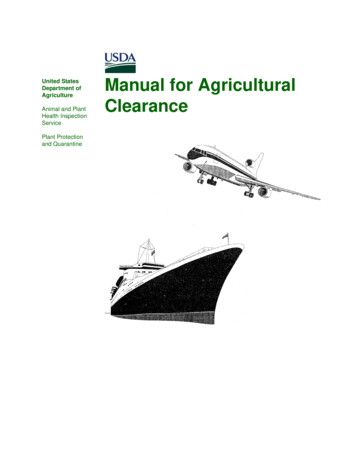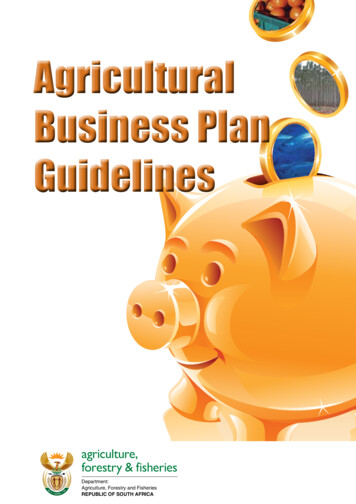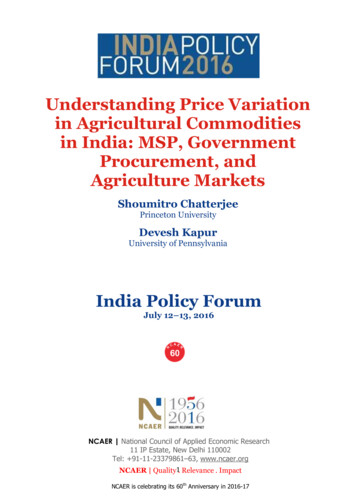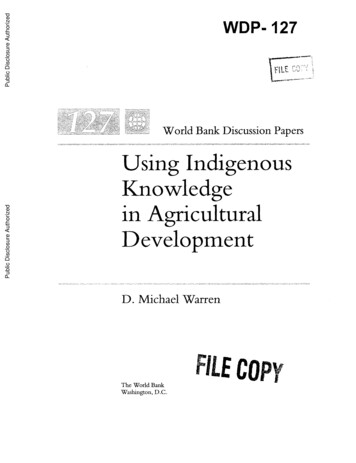
Transcription
Public Disclosure AuthorizedPublic Disclosure AuthorizedPublic Disclosure AuthorizedWDP- 1271 ir cc»3-i'':'i iWorld Bank Discussion PapersUsing IndigenousKnowledgein AgriculturalDevelopment0Public Disclosure AuthorizedD. Michael WarrenThe World BankWashington, D.C.
RecentWorldBankDiscussionPapersNo.69A Multilevel Model of SchoolEffectivenessin a Developing Country. Marlaine E. Lockheed and Nicholas T. LongfordNo.70User Groups as Producersin ParticipatoryAfforestation Strategies.Michael M. CerneaNo.71How Adjustment ProgramsCan Help the Poor: The World Bank's Experience. Helena Ribe, Soniya Carvalho,Robert Liebenthal, Peter Nicholas, and Elaine ZuckermanNo.72Export Catalysts in Low-Income Countries: A Review of Eleven SuccessStories. Yung Whee Rhee and Therese BelotNo.73Information Systems and Basic Statistics in Sub-Saharan Africa: A Review and Strategyfor Improvement. RameshChanderNo.74Costs and Benefits of Rent Control in Kumasi, Ghana. Stephen Malpezzi, A. Graham Tipple, and Kenneth G.WillisNo.75No.76Ecuador's Amazon Region: Development Issues and Options.James F. Hicks, Herman E. Daly, Shelton H. Davis,and Maria de Lourdes de Freitas [Alsoavailablein Spanish (75S)]Debt Equity Conversion Analysis: A Case Study of the Philippine Program.John D. Shilling, Anthony Toft, andWoonki SungNo.77Higher Education in Latin America: Issues of Efficiency and Equity. Donald R. WinklerNo.78The Greenhouse Effect: Implicationsfor Economic Development. Erik Arrhenius and Thomas W. WaltzNo.79Analyzing Taxes on Business Income uith the Marginal Effective Tax Rate Model. David Dunn and AnthonyPellechioNo.80No.81Environmental Management in Development: T he Evolution of Paradigms.Michael E. ColbyLatin America's Banking Systems in the 1980s: A Cross Country Comparison. Felipe Morris, Mark Dorfinan,Jose Pedro Ortiz, and others.No.82Why Educational PoliciesCan Fail: An Overview of Selected African Experiences. George PsacharopoulosNo.83Comparative African Experiences in Implementing Educational Policies.John CraigNo.84Implementing Educational Policiesin Ethiopia. Fassil R. KirosNo.85Implementing Educational Policiesin Kenya. G. S. EshiwaniNo.86Implementing Educational Policiesin Tanzania. C. J. GalabawaNo.87Implementing Educational Policiesin Lesotho. r. Sohl ThelejaniNo.88Implementing Educational Policiesin Swaziland. Cisco MagalulaNo.89ImplementingEducational Policiesin Uganda. Cooper F. OdactNo.90Implementing Educational Policiesin Zambia. Paul P. W. AcholaNo.91Implementing Educational Policiesin Zimbabwe. 0. E. MaravanyikaNo.92Institutional Reforms in Sector Adjustment Operations: The World Bank's Experience. Samuel PaulNo.93Assessment of the Private Sector:A Case Study and Its Methodological Implications. Samuel PaulNo.94Reaching the Poor through Rural PublicEmployment: A Survey of Theory and Evidence. Martin RavallionNo.95Education and Development: Evidencefor New Pnorities.Wadi D. Haddad and othersNo.96Household Food Security and the Role of Women. J. Price Gittinger and othersNo.97Problems of Developing Countries in the 1990s. Volume I: General Topics. F. Desmond McCarthy, editor(Continuedon the inside back cover.)
WA.iWorld Bank DiscussionPapersU sing IndigenousKnowledgein AgriculturalD evelopn-mentD. Michael WarrenThe World BankWashington, D.C.
Copyright 0 1991The International Bank for Reconstructionand Development/THE WORLD BANK1818 H Street, N.W.Washington, D.C. 20433, U.S.A.All rights reservedManufactured in the United States of AmericaFirst printingJuly 1991Discussion Papers present results of country analysisor research that is circulated to encourage discussionand comment within the development community. To present these resultswith the least possible delay, thetypescript of this paper has not been prepared in accordance with the procedures appropriate to formalprinted texts, and the World Bank accepts no responsibilityfor errors.The findings, interpretations, and conclusionsexpressed in this paper are entirely those of the author(s) andshould not be attributed in any manner to the World Bank, to its affiliatedorganizations, or to members ofits Board of Executive Directors or the countries they represent. The World Bank does not guarantee theaccunracyof the data included in this publication and accepts no responsibilitywhatsoever for anyconsequence of their use. Any maps that accompany the text have been prepared solelyfor the convenienceof readers; the designationsand presentation of material in them do not imply the expressionof any opinionwhatsoever on the part of the World Bank, its affiliates,or its Board or member countries concerning thelegal status of any country, territory, city, or area or of the authorities thereof or concerning the delimitationof its boundaries or its national affiliation.The material in this publication is copyrighted. Requests for permission to reproduce portions of it shouldbe sent to Director, Publications Department, at the address shown in the copyright notice above. TheWorld Bank encourages dissemination of its work and will normally give permission promptly and, when thereproduction is for noncommercial purposes, without asking a fee. Permission to photocopy portions forcassroomuse is not required, though notification of such use having been made will be appreciated.The complete backlist of publications from the World Bank is shown in the annual Index of Publications,which contains an alphabeticaltitle list (with full ordering information) and indexes of subjects,authors, andcountries and regions. The latest edition is availablefree of charge from the Publications Sales Unit,Department F, The World Bank, 1818 H Street, N.W., Washington, D.C. 20433, U.S.A., or fromPublications, The World Bank, 66, avenue d'I.na, 75116 Paris, France.ISSN: 0259-210XD. Michael Warren is director of the Center for Indigenous Knowledge for Agriculture and RuralDevelopment at Iowa State University; he is a consultant to the Agriculture and Rural DevelopmentDepartment of the World Bank.Library of Congress Cataloging-in-PublicationDataWarren, Dennis M.Using indigenous knowledge! in agricultural development / D.Michael Warren.p.cm. -- (World Bank discussion papers ; 127)Includes bibliographical references.ISBN 0-8213-1884-51. Agricultural assistancie--Management. 2. Agriculturaldevelopment projects--Management. 3. Agriculture--Economic aspects-Developing countries.I. Title. II. IP
ABSTRACTTheWorldBank,like other majordevelopmentagencies,has beeninterestedin waysto dividualand institutional developmentcapacity, and assurethe long-termsustainabilityof development. There is a growing body ofevidencedescribingthe positiveusesof indigenousknowledgein developmentprojectsand manysuccessesin building upon it. The literatureshows that by understandingand working withindigenousknowledgeand decision-makingsystemsand lding,and sustainabilityall can be enhancedin cost-effectiveways.Thebeliefthat indigenousknowledgesystemsare simpleand static is changingfast.Manysocietieswith simpletechnologieshaveverycomplexand ll knowledgesystemsaredynamic,with elementsof bothcontinuityandchange.Changeis not random,but rather predicatedupon consciousefforts by peopleto define theirproblemsand seek solutionsthrough local experimentsand innovationas well as by evaluatingtechnologiesdevelopedelsewhere.This paperreviewsthreetypesof edan improvedapproachto managingnaturalresourcesthan proposedprojecttechnologies,projects that inadvertentlyignoredindigenousstructures,and those projectswhose successatmeetingtheir objectivescan be linked to the deliberateincorporationof indigenousknowledgecomponents.Thecasefor usingindigenousknowledgein projectwork is straightforward.Technicalsolutionsto unperceivedproblemsarenot readilyadopted,new technologiesthat duplicateindigenousonesare superfluous,and ignoringlocalapproachesto localproblemsis wasteful.
ACKNOWLEDGEMENTThe authorthanks MichaelM. Cerneaand Scott Guggenheimfor their initiativeandsupport in my writing this paper and presentinga seminar on IndigenousKnowledgeandDevelopment,aspart of the seminarserieson the Sociologyof NaturalResourceManagementat theWorld Bank.The author is gratefulfor the assistanceof B. Rajasekaranin the survey of IBRDdocumentsavailableat the CIKARDDocumentationUnit for this paper. Mr. Rajasekaran,a CIKARDresearchassociateanddoctoralstudentin AgriculturalExtensionat Iowa StateUniversity,servedasin internat the WorldBankduringthe summerof 1990. Assistancein technicaleditingwasprovidedby PaulMundyand Lois Domek. Numeroususefuldocumentsas well as valuablesuggestionsforimprovingearlierdrafts of this paperwere providedby MichaelCernea,Scott Guggenheim,CynthiaCook,J. W. Smyle,MichelJ. Petit,ShawkiBarghouti,V. essorO. MichaelWarrenis Directorof the Centerfor IndigenousKnowledgefor AgricultureandRuralDevelopment,Iowa StateUniversity
TABLE OF CONTENTSPMoINTRODUCTION.SYSTEMS .CASE STUDIESOF INDIGENOUSKNOWLEDGEAND DECISION-MAKING. 29INDIGENOUS KNOWLEDGE AND DEVELOPMENT PROJECTS .Caseswhere local knowledge provided an improved approachto managingnatural resourcesthan proposedproject technologies .11Caseswhere development projects inadvertently ignored or overrodelocal technologies or resource managementpatterns .17Caseswhere projects deliberately worked with and through indigenouscencepts and social systems .21MAKING RURALPEOPLEPARTNERSIN RESEARCHAND DEVELOPMENT.27ESTABLISHINGA GLOBALSYSTEMFORINDIGENOUSKNOWLEDGE .30AND THE WORLDBANK .INDIGENOUSKNOWLEDGE32REFERENCES.35.
INTRODUCTIONThe World Bankoperatesin numerousdevelopingcountries that have agricultural andnatural-resourcemanagementtraditions stretching severalmillennia into the past. Hundredsof ethnicgroups in dozens of ecological zones have generated a vast body of indigenous natural-resourcemanagementand agriculturalknowledge. Collectivelythey representa dynamic information basethathas supported an immense population by adapting to constantly changing circumstances. Theseindigenousknowledgesystems have been largelyignoredin many developingcountries (Jiggins 1989;Slikkerveer1989; Warren 1989a). But we are now beginningto recognizethat indigenousknowledgeis an important national resource that can facilitate the development process in cost-effective,participatory, and sustainableways (Vanek 1989; Hansenand Erbaugh 1987).Indigenousknowledge (IK) is local knowledge--knowledgethat is unique to a givenculture or society. IK contrasts with the internationalknowledge system generated by universities,researchinstitutions, and private firms. It is the basis for local-leveldecision-makingin agriculture,health care, food preparation,education, natural-resourcemanagement,and a host of other activitiesin rural communities. Such knowledge is passed down from generation to generation, in manysocieties by word of mouth. Indigenousknowledge has value not only for the culture in which itevolves, but also for scientists and planners striving to improve conditions in rural localities. Everysociety has a large body of technical knowledge based on careful observationand use of its naturalresources. Every society also has mechanismsthrough which indigenous knowledge provides thebasisfor group decision-makingand the generationof new knowledge and technologieswhen currentproblemsand how to cope with them are discussed. And every society has ways to disseminatenewinformation and technologies, whether generated within the society or outside of it (Mundy andCompton 1991).By recording indigenousknowledge systems IlKSs),they can then be compared andcontrasted with the international knowledge system. It is possible to identify beneficial aspects of
-2 -the IKSs as well as those that could be improved through science-basedtechnologies. The validityand cost-effectiveness of indigenoustechnologiescan be tested scientifically.Indigenousknowledge is important for many kinds of development activities to besuccessful. If it has not been recorded, it remains largely inaccessibleto development workers.Solutionsoffered by a developmentprojeictmayfail becausethey do not fit with the local knowledge.Indigenousknowledge may suggest alternatives. Indigenoustechnologies used effectively by onesociety can be used to solve problemsfaced by another society in a similar agroecosystem locatedin another part of the world. A blend of approachesand methods from various systems may beappropriate.The successof a developmentproject often dependson local participation. Familiaritywith indigenousknowledge can help changeagents understandand communicate with local people,enhancingthe possibilitiesfor participatoryand sustainableapproachesto development. This enablesproject staff and local people to work as partners in planning and implementing developmentactivities. Although this discussionpaper focuses on the role of indigenousknowledge in facilitatingthe vrocess of development,it is important to stress that the enhancedprocess will result in improvedproducts of development,such as the higher incomes resulting from increasedcrop production dueto better soil and water conservation resulting from the use of Vetiveria grass.CASE STUDIESOF INDIGENOUSKNOWLEDGEAND DECISION-MAKINGSYSTEMSThere are now hundredsof studiesthat have recorded indigenousknowledge in manycountries. A review of these documentsreveals useful insights into how indigenousknowledge andscientific research can benefit from one another. Despite improvements
Michael Warren. p. cm. -- (World Bank discussion papers ; 127) Includes bibliographical references. ISBN 0-8213-1884-5 1. Agricultural assistancie--Management. 2. Agricultural development projects--Management. 3. Agriculture--Economic aspects--Developing countries. I. Title. II. Series. HD1431.W37 1991 338.1'8'091724--dc2O 91-25792 CIP
